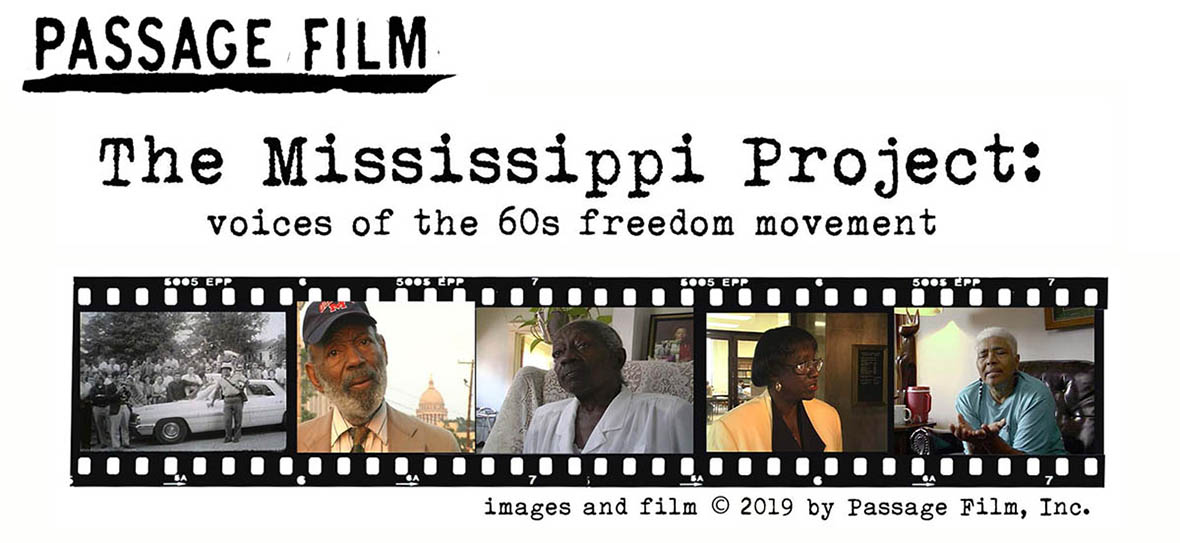


The Mississippi Movement was ground zero of the American Civil Rights Movement; it was the only place where the four major Civil Rights groups worked together as one, creating COFO, the Council of Federated Organizations.
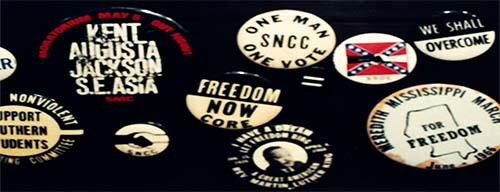
COFO made history, dragging Mississippi into the 20th Century and creating a democratic society that replaced the police state installed by Mississippi segregationists.
The Mississippi Movement had many different initiatives, which were sometimes collectively called “The Mississippi Project”.
Kent Moorhead of Passage Film, Inc. has filmed over a hundred hours of interviews with participants in the Mississippi Movement. We want to tell this story by creating a series of short films under this name – "The Mississippi Project".
The long-term goal is to create a stand-alone interactive website where the public can access these video interviews and other information, and also participate in discussions about the subject.
Each film will have its own story, but the website will be organized so that a user can dig deeper into each subject, following a narrative of their choosing. And hopefully get involved in today's Movement.
But for now this is a self-funded project and of necessity, work will proceed slowly and be showcased here as it is completed.
The issues of the Mississippi Project were voting rights, early childhood education and childcare, education and political participation – along with access to good jobs, housing and public services. These are still the issues of today. This is a living project, not dead history.
The Mississippi Project will also include the history of a pivotal but little understood moment in American history, the Insurrection at Ole Miss, which followed the enrollment of James Meredith as the first black student at the University of Mississippi.
James Meredith is a controversial and little-understood figure in Civil Rights history, but his impact was crucial, both in the integration battle at the University of Mississippi and later during the Meredith March, which brought the Black Power Movement to national attention.
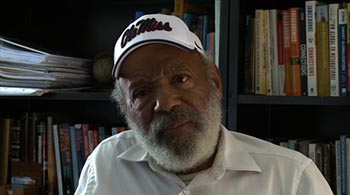 James Meredith in 2012 interview.
James Meredith in 2012 interview.
© 2019 by Passage Film, Inc.
Kent Moorhead has interviewed James Meredith three times from 2002 to 2012. He has also talked to many other participants about the events of 1962. Moorhead also experienced this history first-hand, as an eight-year-old boy growing up in Oxford, Mississippi. You can read more here about his film on Meredith, "Me and My Kind: James Meredith's War".
"I've burned for this for a long time," says Kent Moorhead, "to preserve the knowledge of and interest in Civil Rights in Mississippi. I've done over sixty interviews with people who were there."
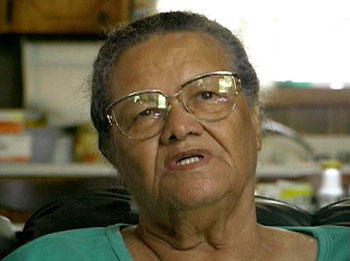
Winson Hudson talking to Kent Moorhead
© 2019 by Kent Moorhead
Some interviews are leading figures who are still alive, such as James Meredith and Bob Moses and Charlie Cobb. But others are with leaders who can no longer be interviewed: such as Winson Hudson, Unita Blackwell, Aaron Henry, Victoria Gray and Annie Devine.
"I also have many interviews with foot soldiers, the people that worked in the movement, but were not in the leadership. I think its important to have both, because it's only when ordinary people engage that you actually make a political change."
Scroll down to see the first two films that have been done for The Mississippi Project, both of them Public Service Announcements to promote voting in the 2018 congressional elections.
Unita Blackwell joined the Civil Rights movement when she realized that her poverty was connected to the laws that prevented her from voting, because she was black. She talks here about the importance of taking that first step in voting – registration. In 1960s Mississippi, voter registration was both difficult and dangerous if you were black. The interview with Ms. Blackwell is from 1997. But the struggle for fair voting laws and procedures continues today. Many states are again making it difficult to register and vote. Unita Blackwell explains that if someone is trying to take away your right to vote, it's because that vote means something important, and rather than giving up, you should fight for your right to share in the political power and the rights of citizenship that comes from your vote. Unita Blackwell became an organizer for SNCC, the Student Non-violent Coordinating Committee. And in the 1976 she became Mayor of Mayersville, Mississippi. Despite being the County Seat for Issaquena County, there were no paved road, sewage or water systems. Residents also had no good housing. Mayor Blackwell changed all that, incorporating the town for the first time, which qualified it for Federal grants. She then paved the roads, named the streets, put in sewage and water systems, built new housing and created a city park where cotton fields once stood. She demonstrated the power of the vote.
Victoria Gray was a field secretary in Mississippi for the Student Nonviolent Coordinating Committee (SNCC). She was one of the most important figures in the Mississippi Civil Rights Movement and played a key role in the creation of the Mississippi Freedom Democratic Party, which eventually replaced the all-white Regular Democratic Party of Mississippi’s segregationist Democrats. Along with Annie Devine and Fannie Lou Hamer she was one of the “Big Three” of the Mississippi Movement. In 1964 she challenged Senator John Stennis for his Senate Seat. While unsuccessful, this led to the Congressional Challenge of 1965, when together with Fannie Lou Hamer and Annie Devine, she asked the Congress to refuse to seat the Mississippi politicians who had won their seats only because black voters were disenfranchised. The Congress seated the white politicians, but also warned them to stop the all-white primaries that prohibited participation by black voters. Together with the Voting Rights Act of 1965, this Congressional Challenge was a key factor in eventually forcing Mississippi to open its political system to all its citizens, regardless of color.
Augusta Hicks was a friend of Fannie Lou Hamer. And a soldier in the Civil Rights movement. She isn't famous. And her own family didn't realize how much she did until they saw this video that Kent Moorhead put on Youtube in 2009. It was local people, like Augusta Hicks, that changed Mississippi by taking a stand where it mattered.
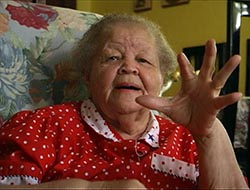 In Kent Moorhead's interviews, people talked about the nuts and bolts of the movement: voting rights and how people were trained to vote. Headstart and how it worked when it was just a Mississippi program. How the Mississippi Freedom Democratic Party was set up and how it proved there was no real democracy in Mississippi. How the opposition worked, the White Citizen's Councils, and the Sovereignty Commission, which was Mississippi's Secret Police.
It's not just what people felt about things, although that's important. It's how they did what they did. Because it was those actions that changed Mississippi and changed America. The only problem is there's a lot left to change . . .
In Kent Moorhead's interviews, people talked about the nuts and bolts of the movement: voting rights and how people were trained to vote. Headstart and how it worked when it was just a Mississippi program. How the Mississippi Freedom Democratic Party was set up and how it proved there was no real democracy in Mississippi. How the opposition worked, the White Citizen's Councils, and the Sovereignty Commission, which was Mississippi's Secret Police.
It's not just what people felt about things, although that's important. It's how they did what they did. Because it was those actions that changed Mississippi and changed America. The only problem is there's a lot left to change . . .
We created this Civil Rights Timeline for those who are interested in more detail on how the movement played out in Mississippi. For those wanting a deeper dive into Civil Rights, check out the SNCC Digital Gateway and also Veterans of the Mississippi Civil Rights Movement. To step back in time and see just how hard it was in Mississippi, and what movement activists faced, read this 1964 "Viewpoint" in the Harvard Crimson: The Failure of the Mississippi Project. Written after the passage of the landmark Civil Rights Act that summer, it shows that resistance civil rights didn't magically disappear with the passage of legislation. There were still a lot of hard-fought years to go. In fact, 55 years later, there still are.
Aaron Henry, at his NACCP office in Jackson, 1990
Victoria Gray Adams, at her home in St. Petersburg, Virginia, 1997
Annie Devine, at her home in Canton, 2 interviews, 1997
Margaret Walker Alexander, at her home in Jackson, 1997
Tom Dent, interview at his home in New Orleans, 1997
Unita Blackwell, at her home in Mayorsville, also at church with her elderly mother, 1997
Unita Blackwell in Jackson, Mississippi looking at her Sovereignty Commission files, 1998
Ellen Douglass (Jo Haxton) at her home in Jackson, 1997
Winson Hudson, at her home in Harmony, Mississippi, 1997
Dorie Ladner, at her home in Washington, DC, 1997
Will Campbell, at Ole Miss, 1998
Pat Darian at her home in Alexandria, Virginia, 1997
Joan Mulholland, Freedom Rider, in Washington, D.C., 1997
Bill Minor, at his home in Jackson, 1997
Bob Moses and Charlie Cobb at Lanier High School with the Algebra Project, 1997
Bobby Delaughter, prosecutor in Medgar Evers assasination, 2000
Governor William Winter talking about Sovereignty Commission, 2000
Duncan Gray II talking about his role in Meredith & Ole Miss riot, 2000
Nathan Hodges, witness against Theodore Bilbo in 1946 hearing, 2002
Alva N. Temple, Tuskegee Airman, 2002
James Meredith, in Jackson, 3 interviews 2002, 2005, 2012
Kent Moorhead's film collection, along with his Civil Rights interviews, is now at the Southern Historical Collection, in the Wilson Library at the University of North Carolina, Chapel Hill.
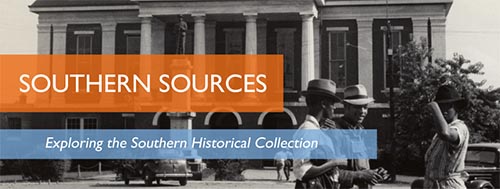
A few of the interviews were shot on 16mm film, but most were recorded on DVC PRO videotape, which is nearly 20 years old and badly in need of transfer to a digital format for preservation. They are not yet available to researchers in a digital format, but he intends to work with UNC on locating grants that will make that possible.
The issues in these films: voting rights, early childhood education and childcare, education and political participation are all very much the issues of today as well. Most of the interviews focus on women, and it was women who did most of the community organization necessary in the movement. They were also leaders in founding Head Start, which at that time provided education to both children and parents and became a national program only after it was invented by the Mississippi Movement. And women also took the lead in much of the political work, like getting people to register to vote, building the Mississippi Freedom Democratic Party and trying to rid Mississippi of its racist congressmen with the Mississippi Congressional Challenge of 1965, which Victoria Gray felt was the most important achievement of the Mississippi Civil Rights Movement.
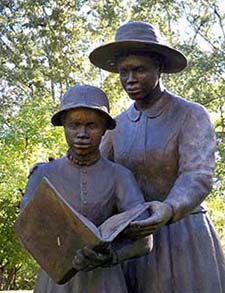 The Civil Rights movement didn't come from nowhere, it has deep roots stretching back into the past. It's hard to understand where we are now, if we don't also understand the history of the Civil War and Reconstruction, particularly the part African Americans played in that earlier struggle. The image here is a statue of a young black girl learning to read. It's part of the Corinth Contraband Camp Historical Site and it shows that the war wasn't just about fighting. It was also about black people reaching freedom inside Union lines where they learned to read & began building a new society. That was the freedom movement of the 1860s and without it we wouldn't have what came 100 years later.
The Civil Rights movement didn't come from nowhere, it has deep roots stretching back into the past. It's hard to understand where we are now, if we don't also understand the history of the Civil War and Reconstruction, particularly the part African Americans played in that earlier struggle. The image here is a statue of a young black girl learning to read. It's part of the Corinth Contraband Camp Historical Site and it shows that the war wasn't just about fighting. It was also about black people reaching freedom inside Union lines where they learned to read & began building a new society. That was the freedom movement of the 1860s and without it we wouldn't have what came 100 years later.
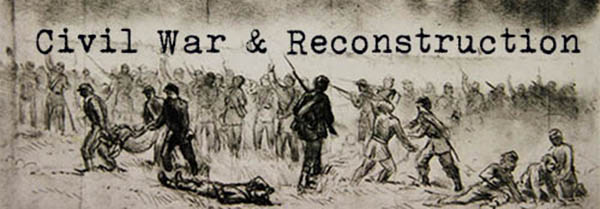
When I interviewed Movement leader Annie Devine, I asked her to tell me when she thought the movement had started. She answered that it had always been there, that enslaved Africans had longed for freedom and fought for it from the first. And that it was still going on, the Movement never stopped. She then gave a long, beautiful history of the struggle. Her eloquent answer changed the way I looked at things. Since then I've studied the Civil War alongside Civil Rights. I used to view these as separate things – not anymore. Check out Civil War & Reconstruction for more.